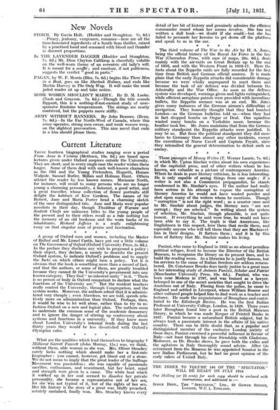Panizzi, who came to England in 1823 as an almost
penniless political refugee, lived to become the Director of the British Museum, to reorganise the library on its present lines, and to build the reading room. As a librarian he is justly famous, but his services to the cause of Italian freedom are seldom remem- bered. Dr. Constance Brooks does tardy justice to a great man in her interesting study of Antonio Panizzi, Scholar and Patriot (Manchester University Press, 10s. 6d.). Panizzi, who HMS born near Modena in 1797, and was trained as a lawyer, belonged to one of the secret societies that sought to drive the Austrians out of Italy. Fleeing from the police, he came to England and settled in Liverpool, where William Roscoe and other cultured people helped him to,find work as a teacher and lecturer. He made the acquaintance of Brougham and contri- buted to the Edinburgh Review. He was the first Italian Professor at University College, London, in 1828. Three years later Brougham found him a post in the British Museum library, in which he was made Keeper of Printed 'Books in 1837. Panizzi became a naturalised British subject, but he always took a passionate interest in the affairs of his native country. There can be little doubt that, as a popular and distinguished member of the exclusive London society of those days, Panizzi exercised a powerful influence in favour of Italy—not least through his close friendship with Gladstone. Moreover, as Dr. Brooks shows, he gave both the exiles and the agitators in Italy thoroughly sound advice. After ids retirement from the Museum-be -was appointed Senator in the new Italian Parliament, but he had no great opinion of the early rulers of United Italy.


































 Previous page
Previous page